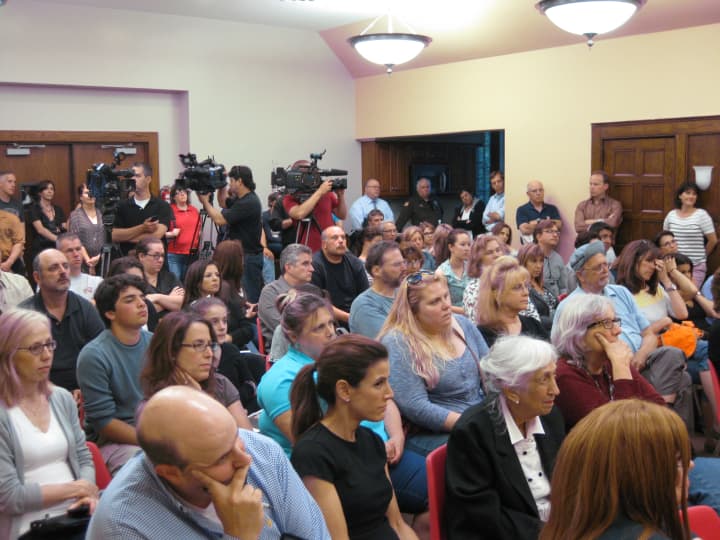With Channel 2 News, Fox News, and NBC News in attendance, the two experts generally provided similar advice regarding coyotes: they’re here to stay, and the best way to co-exist with them is to be “aggressive, assertive” and use aggressive “hazing” techniques to instill fear in them.
“Co-existing with coyotes is easier than you might think. It’s not rocket science,” said Vicente, who admitted he would be the “fall guy” for the audience since his views tend to take on the perspective of the coyotes.
“It comes down to being a responsible dog owner,” he said. “Your presence will most likely deter any confrontation with coyotes.”
Vicente said the most effective method to deal with coyotes was “aggressive hazing,” which includes anything from yelling at them, hosing them with water and throwing rocks or sticks at them. In fact Vicente’s favorite approach is to simply chase them off by running directly at them—something he said he takes pride in doing for concerned citizens.
Clarke said he agreed with everything Vicente said, although he could not recommend charging at them on behalf of the state for safety reasons. But he did agree hazing them—rather then lethally removing or trapping them—is most likely to be the most effective approach as a community.
“The most important message I can get across tonight is ‘coyotes are here’,” he said. “They are here to stay and impossible to eliminate. You simply have to understand they’re on our landscape.”
But that doesn’t mean there aren’t ways to deal with their presence.
“The are one of the most opportunistic species we’ve ever seen on this planet and they do very well living among humans. They also are very adaptable. They’ll start to learn fear of people where people develop reason for fear,” he added.
Although Clarke and Vicente provided an abundance of explanation and tips on how to deal with coyotes, the room full of residents had no shortage of questions.
Several residents in the crowd were pet owners of recent small dog victims—most notable the Dresner’s—who lost their dog Ruby two weeks ago to a coyote. There were multiple demands for a more specific solution to handle coyotes other than “hazing,” most notably a more proactive alert system from the town’s police department.
While New Castle Police sent out a Nixle alert two weeks ago—after two attacks had been publicly discussed—one resident said he placed a call on Memorial Day to the police that he had seen a coyote and no action was taken. Chief of Police Charles Ferry was in attendance and addressed such concerns, saying an alert can’t be sent out every time someone sees a coyote.
“The bottom line is if you have a small dog, you need to keep it close to you,” he said.
Along with aggressive hazing, the best way for residents to handle coyote sightings and incidences is to contact the DEC Region 3 Wildlife Office at 845-256-3098. Additionally, Town Administrator Penny Paderewski said new information from the DEC and Save Wild Dogs would be posted on mynewcastle.org later this week.
Click here to follow Daily Voice Ossining and receive free news updates.







